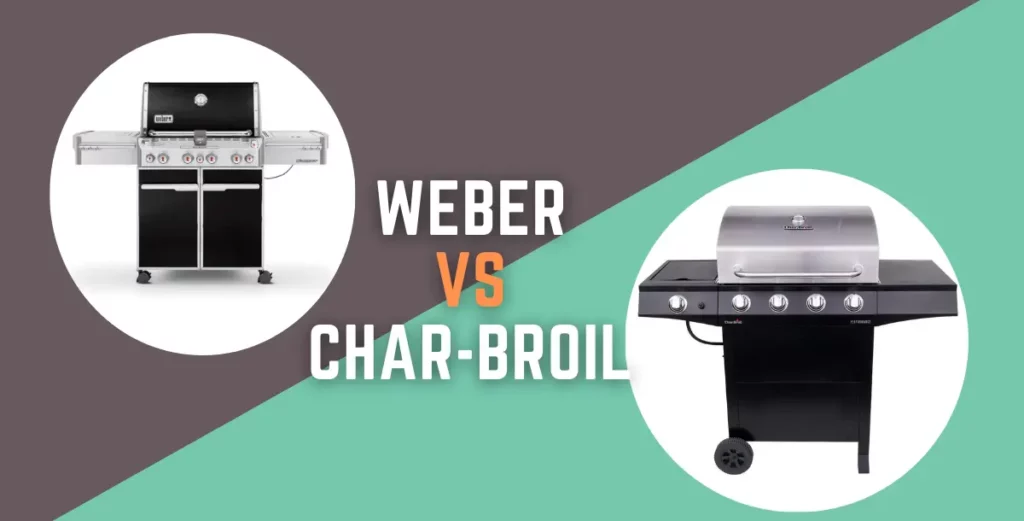This post may contain affiliate links. If you use these links to buy something we may earn a small commission. Thanks.
In the world of outdoor grilling, Weber and Char-Broil stand out as two of the most recognized and respected brands. Both have a rich history of delivering quality grills that cater to a wide range of cooking styles and preferences. This article aims to provide a thorough comparison between these two brands, helping consumers make an informed decision when purchasing their next grill.
Brand History and Reputation
Weber, founded in 1952 by George Stephen, revolutionized outdoor cooking with the invention of the kettle grill. Over the years, Weber has maintained a reputation for high-quality, durable products and has become synonymous with traditional grilling.
Char-Broil, established in 1948, has been at the forefront of grill innovation, particularly in gas grills. Known for their affordability and acessibility, Char-Broil grills are popular among casual grillers and those new to outdoor cooking.
Comparatively, while Weber is often viewed as a premium brand, Char-Broil is perceived as more budget-friendly, offering good quality at a more accessible price point.




This table highlights the key differences and similarities between the two grills. The Char-Broil model is designed for propane, while the Weber is a natural gas unit. The Weber grill has a higher BTU rating, indicating more power, but the Char-Broil offers a versatile side burner. Both grills feature quality construction and have their unique advantages, such as the LED-illuminated knobs on the Char-Broil and the Tuck-Away rotisserie system on the Weber.

Product Range and Variety
Weber offers a wide range of products, including gas, charcoal, and electric grills, as well as portable grills for on-the-go cooking. Their product line is known for its versatility and options that cater to both beginners and seasoned grill masters.
Char-Broil’s product line is equally diverse, with an emphasis on gas grills. They are pioneers in infrared cooking technology, which is featured in many of their models, offering faster cooking times and more even heat distribution.
Quality and Durability
Weber grills are renowned for their robust construction and use of high-quality materials, ensuring longevity and consistent performance. Their grills often come with a higher price tag, but the investment is typically justified by their durability.
Char-Broil, while generally more affordable, does not compromise significantly on quality. The brand offers durable grills, although they might not match Weber in terms of material quality and lifespan.
Performance and Features
Weber grills are known for their excellent heat control and even cooking. Many models come with unique features like Flavorizer bars, which enhance the taste of the grilled food.
Char-Broil grills, especially those with infrared technology, offer efficient heating and are known for their ability to reduce flare-ups. However, they may lack some of the advanced features found in Weber grills.
Price and Value for Money
Weber grills are generally more expensive, but their durability and performance offer good value over time. For those willing to invest more initially, a Weber grill can be a long-term companion.
Char-Broil offers more affordable options, making them an attractive choice for those on a tighter budget. The value for money is evident in their reliable performance and adequate features.
Weber vs Char-Broil: Pros and Cons
Char-Broil Performance Series Convective 4-Burner
Pros:
- Versatile Fuel Source: Runs on liquid propane gas, convenient for locations without natural gas lines.
- Large Cooking Area: Offers 475 square inches of primary cooking space plus a 130-square inch warming rack, ideal for large gatherings.
- Side Burner: Includes a 10,000 BTU side burner, useful for preparing sides or sauces while grilling.
- LED-Illuminated Control Knobs: Enhances visibility for night grilling and adds a stylish look.
- Porcelain-Coated Cast-Iron Grates: Durable, rust-resistant, and easy to clean, while ensuring even heat distribution.
- Electronic Ignition: Provides reliable and quick starts with the push of a button.
- Removable Grease Tray: Simplifies cleaning and maintenance.
Cons:
- Lower BTU Rating: 36,000 BTU might be less powerful compared to higher-end models.
- Propane Tank Not Included: Additional purchase necessary for the fuel source.
- Durability Concerns: May not match the longevity and build quality of higher-priced grills like Weber.
- Warranty Information Not Specified: Unclear coverage for long-term use.
Weber Summit E-470 4-Burner Natural Gas Grill
Pros:
- High BTU Rating: 48,800 BTU-per-hour input offers powerful cooking performance.
- Premium Construction: Features stainless steel burners and rod cooking grates for durability and quality.
- Tuck-Away Rotisserie System: Innovative feature for versatile cooking options.
- Flavorizer Bars: Enhances the flavor of grilled foods.
- Natural Gas Operation: Convenient for homes with natural gas lines, offering a continuous fuel supply.
- 10-Year Warranty: Excellent long-term investment protection.
- Built-in Thermometer: For precise temperature control.
Cons:
- Requires Natural Gas Line: Limited to locations with natural gas plumbing.
- Higher Price Point: More expensive, possibly out of range for budget-conscious buyers.
- Complex Assembly: Might require more time or expertise to assemble (though 3D interactive instructions are available).
- Size and Weight: Potentially larger and heavier, requiring more space and effort to move.
Customer Support and Warranty
Weber is well-regarded for its customer service and generous warranty terms, often exceeding industry standards. This commitment to customer satisfaction adds value to their higher price point.
Char-Broil also offers commendable customer support, with warranty terms that are reasonable but might not be as extensive as Weber’s.
User Reviews and Feedback
Weber consistently receives high marks in customer reviews, with praise for their build quality and cooking performance. Common complaints are usually about the price.
Char-Broil reviews are generally positive, with customers appreciating the value for money. Some critiques point to a shorter lifespan compared to higher-end models like Weber.
Environmental and Safety Considerations
Both Weber and Char-Broil have made strides in incorporating eco-friendly practices. Weber emphasizes durable construction to extend the life of their grills, reducing waste. Char-Broil’s infrared technology is efficient, potentially reducing fuel consumption.
Safety is paramount for both brands, with each offering features like stable construction and flame-control mechanisms to prevent accidents.
Conclusion
In conclusion, the choice between Weber and Char-Broil grills depends largely on individual needs and budget. Weber stands out for its quality, durability, and performance but comes at a higher price. Char-Broil offers affordability and innovative technology, suitable for those who prioritize value for money.
Both brands have their strengths, and the decision ultimately rests on what the consumer values most in their grilling experience. Whether it’s the time-tested reliability of Weber or the cost-effective innovation of Char-Broil, both brands offer something unique to the world of outdoor cooking.
FAQs
Does the grill come with a propane tank?
No, the grill does not include a propane tank. You will need to purchase a 20-pound propane tank separately.
Can the side burner be used for cooking tasks other than warming?
Yes, the 10,000 BTU side burner can be used for various cooking tasks like boiling water, sautéing vegetables, or brewing coffee.
Are the control knobs easy to use at night?
Yes, the control knobs are LED-illuminated, which not only adds style to the grill but also provides ambient light for easy operation at night.
How easy is it to clean the grill?
The grill features a removable grease tray which can be cleaned easily. For additional convenience, you can use an aluminum liner to contain drippings.
Can the grill be used with propane gas?
No, this specific model is designed for natural gas only and requires a natural gas line plumbed out to your patio or deck.
What is unique about the grill’s rotisserie system?
The Weber Summit E-470 features a Tuck-Away rotisserie system with a flip-up motor and separate storage for the spit and fork, providing an efficient and space-saving way to cook using the rotisserie.
Does the grill offer any warranty?
Yes, the grill comes with a 10-year warranty, providing a 100% Weber guarantee.
